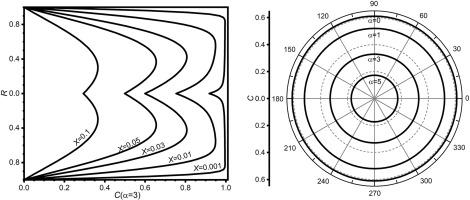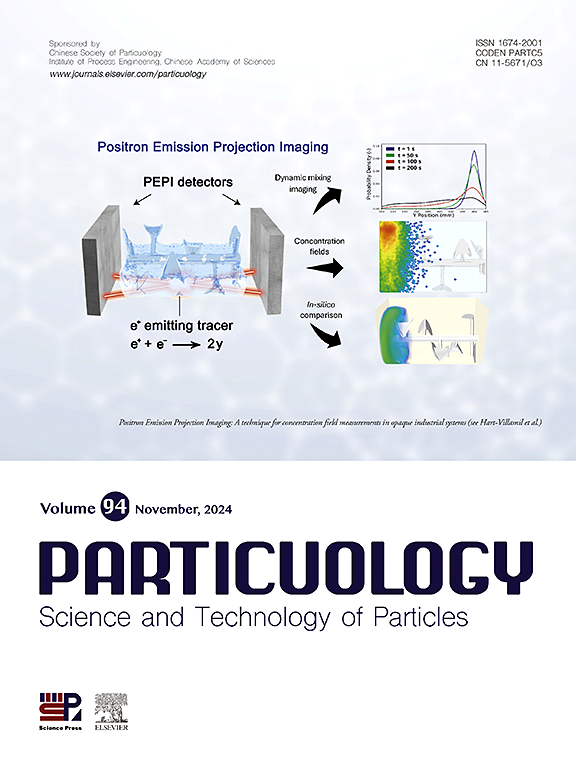Theoretical study on aerosol deposition in a circular tube due to diffusion and thermophoresis in plug laminar flow neglecting coagulation
IF 4.3
2区 材料科学
Q2 ENGINEERING, CHEMICAL
引用次数: 0
Abstract
Aerosol deposition from the plug laminar flow regime in a circular tube due to diffusion and thermophoresis is studied theoretically, and the aerosol concentration, mean concentration or deposition efficiency, and Sherwood number are calculated and analyzed by using the analytical solutions based on the detailed comparison with the previous studies. The results show that aerosol concentration distributions for both mechanisms of individual diffusion and combined consideration of diffusion and thermophoresis are symmetrical. However, the axial concentration for the case of diffusion alone is maximal, the maximal values for deposition parameter larger than zero, which appears in the region of non-dimensional radial coordinate from 0 to 1. The large influence of thermophoresis on aerosol mean concentration is found from the detailed comparison, and the bigger of the transport distance and the deposition parameter, the smaller of the aerosol mean concentration. The Sherwood number decreases with the increase of axial coordinate for deposition parameter equal and larger than zero, and the bigger of the deposition parameter, the larger of the deposition velocity.

忽略混凝的旋塞层流中扩散和热电泳引起的气溶胶在圆管内沉积的理论研究
本文从理论上研究了圆形管内塞状层流区由于扩散和热电泳引起的气溶胶沉积,并在与前人研究进行详细对比的基础上,利用解析解对气溶胶浓度、平均浓度或沉积效率、Sherwood数进行了计算和分析。结果表明,在单独扩散和综合考虑扩散和热泳的两种机制下,气溶胶浓度分布都是对称的。而仅扩散时轴向浓度最大,沉积参数最大值大于零,出现在0 ~ 1的无因次径向坐标区域。详细对比发现,热泳动对气溶胶平均浓度的影响较大,输运距离和沉积参数越大,气溶胶平均浓度越小。当沉积参数大于等于零时,Sherwood数随轴向坐标的增大而减小,沉积参数越大,沉积速度越大。
本文章由计算机程序翻译,如有差异,请以英文原文为准。
求助全文
约1分钟内获得全文
求助全文
来源期刊

Particuology
工程技术-材料科学:综合
CiteScore
6.70
自引率
2.90%
发文量
1730
审稿时长
32 days
期刊介绍:
The word ‘particuology’ was coined to parallel the discipline for the science and technology of particles.
Particuology is an interdisciplinary journal that publishes frontier research articles and critical reviews on the discovery, formulation and engineering of particulate materials, processes and systems. It especially welcomes contributions utilising advanced theoretical, modelling and measurement methods to enable the discovery and creation of new particulate materials, and the manufacturing of functional particulate-based products, such as sensors.
Papers are handled by Thematic Editors who oversee contributions from specific subject fields. These fields are classified into: Particle Synthesis and Modification; Particle Characterization and Measurement; Granular Systems and Bulk Solids Technology; Fluidization and Particle-Fluid Systems; Aerosols; and Applications of Particle Technology.
Key topics concerning the creation and processing of particulates include:
-Modelling and simulation of particle formation, collective behaviour of particles and systems for particle production over a broad spectrum of length scales
-Mining of experimental data for particle synthesis and surface properties to facilitate the creation of new materials and processes
-Particle design and preparation including controlled response and sensing functionalities in formation, delivery systems and biological systems, etc.
-Experimental and computational methods for visualization and analysis of particulate system.
These topics are broadly relevant to the production of materials, pharmaceuticals and food, and to the conversion of energy resources to fuels and protection of the environment.
 求助内容:
求助内容: 应助结果提醒方式:
应助结果提醒方式:


